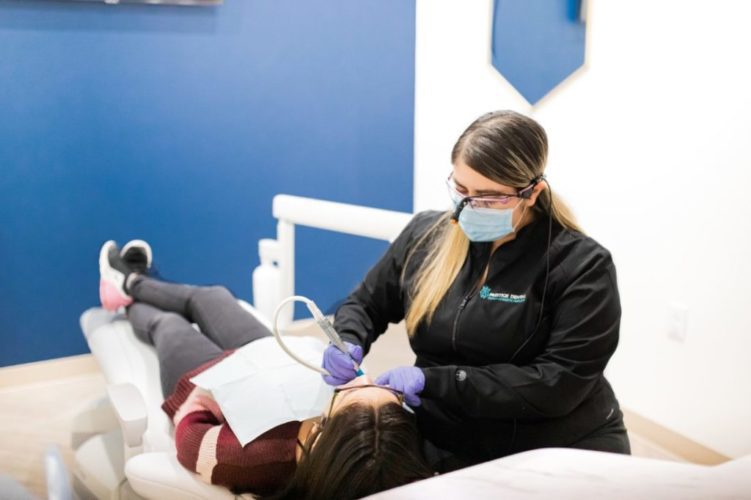Preventive Dentistry in Spring, TX
What Is Preventive Dentistry?
Preventive dentistry is the practice of caring for your teeth to keep them healthy. This helps to avoid cavities, tooth decay, and gum disease.
Preventive dentistry involves:
- Brushing your teeth twice a day with fluoride toothpaste
- Flossing daily
- Eating a healthy diet
- Visiting your dentist regularly for checkups and cleanings
Brushing your teeth effectively removes plaque—a sticky film of bacteria that forms on your teeth and gums. Plaque leads to cavities and gum disease, so it’s important to brush thoroughly every day.
To brush effectively:
- Use a soft-bristled toothbrush and fluoride toothpaste.
- Hold the toothbrush against your teeth at a 45-degree angle.
- Use gentle circular motions to brush the front, top, and back of your teeth.
- Use light back-and-forth strokes to brush your chewing surfaces (the flat surfaces of your molars).
- Spit out the toothpaste after brushing.
If you have trouble brushing effectively, ask your dentist or dental hygienist for help. They can show you how to hold your toothbrush and which type of toothbrush is best for you.
Flossing removes plaque from between your teeth—places where your toothbrush can’t reach. Plaque between teeth leads to cavities and gum disease, so it’s important to floss daily.
To floss effectively:
- Break off about 18 inches (45 cm) of floss and wind it around your middle fingers.
- Hold the floss tightly between your thumbs and index fingers.
- Gently insert the floss between two teeth.
- Use a gentle back-and-forth motion to rub the sides of the tooth together.
- Curve the floss around the base of each tooth in a C shape.
- Slide the floss up and down against the side of the tooth.
- Repeat this process for each tooth.
- Spit out the floss when you’re finished.
If you have trouble flossing, ask your dentist or dental hygienist for help. They can show you how to hold the floss and which type of floss is best for you.
Eating a healthy diet is important for your overall health—and your oral health. A healthy diet includes:
- Plenty of water—Water helps wash away food and plaque from your teeth. It also helps keep your mouth moist, which prevents gum disease.
- Dairy products—Milk, cheese, and yogurt contain calcium, which helps keep your teeth strong.
- Fruits and vegetables—Fruits and vegetables contain vitamins and minerals that are good for your overall health—and they help keep your teeth and gums healthy, too.
- Lean proteins—Lean proteins such as chicken, fish, and tofu are good for your overall health—and they help keep your teeth and gums healthy, too.
- Whole grains—Whole grains contain fiber, which helps keep your teeth clean.
Visiting your dentist regularly is important for keeping your teeth and gums healthy. During a checkup, your dentist will:
- Examine your teeth and gums for signs of cavities or gum disease
- Clean your teeth to remove plaque and tartar (hardened plaque)
- Give you a fluoride treatment to help prevent cavities
- Check for signs of oral cancer
Most dental checkups are quick and painless. And they can save you a lot of time, money, and pain in the long run by catching problems early. So be sure to visit your dentist regularly!

What are the benefits of preventive dentistry?
The benefits of preventive dentistry are many. By keeping your teeth and gums healthy, you can avoid tooth decay, gum disease, and other dental problems. preventive dentistry can also help you keep your natural teeth for a lifetime.
Some of the benefits of preventive dentistry include:
- Fewer cavities: When you practice preventive dentistry, you are less likely to get cavities. This is because plaque and tartar are removed from your teeth on a regular basis, making it harder for bacteria to cause tooth decay.
- Fresher breath: Good oral hygiene habits can help prevent bad breath. Brushing and flossing remove food particles and bacteria from your mouth, which can cause odors.
- Healthier gums: Gum disease is a leading cause of tooth loss. By keeping your gums healthy, you can reduce your risk of developing gum disease.
- Avoidance of costly dental procedures: When you take good care of your teeth, you may be able to avoid expensive dental procedures, such as fillings, crowns, and bridges.
- Improved overall health: Good oral health is linked to good overall health. Studies have shown that people with gum disease are more likely to develop heart disease, stroke, and other serious health conditions.
Additional Frequently Asked Questions:
Who benefits from preventive dentistry?
People that benefit from preventive dentistry are those with good oral hygiene habits, people who have a family history of gum disease or cavities, people who are at high risk for developing gum disease or cavities, and people who have had prior dental work done.
Why Preventive Dental Care is So Important:
Preventive Dental Care is So Important because it can help you keep your smile healthy and looking great. Regular dental checkups and cleanings can remove plaque and tartar that can lead to gum disease, tooth decay, and bad breath. And, if you have any problems with your teeth or gums, your dentist can spot them early and treat them before they become serious.
So, if you want to keep your smile looking its best, be sure to see your dentist regularly for preventive dental care.
Best practices for healthy teeth:
1.Brush at least twice a day with fluoride toothpaste.
2.Floss every day to remove plaque from between your teeth.
3.Visit your dentist regularly for professional cleanings and checkups.
4.Eat a balanced diet and limit sugary snacks and drinks.
5.Don’t smoke or use other tobacco products.
following these simple steps can help you maintain healthy teeth and gums throughout your life!


